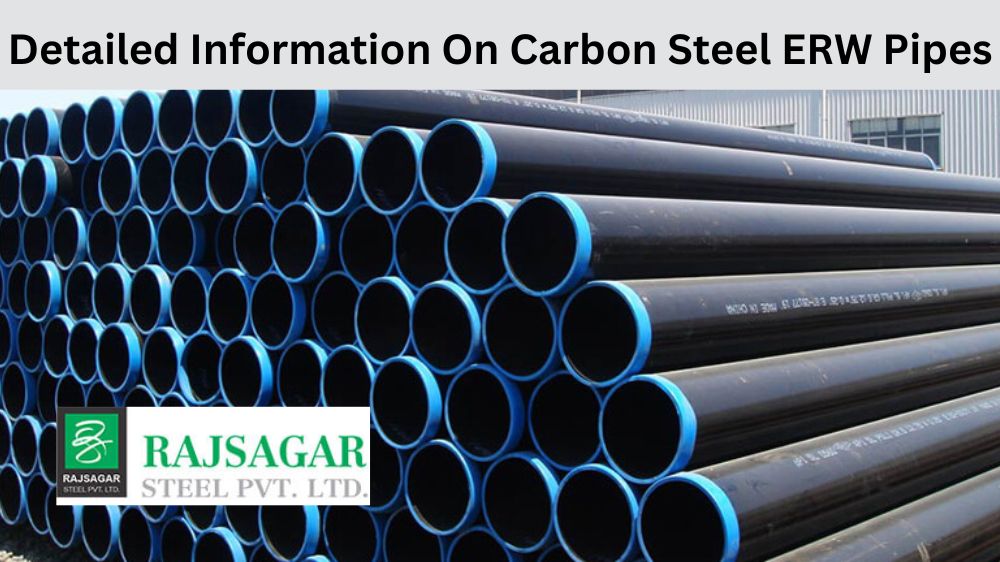Carbon Steel ERW Pipes are an important type of pipe used in various industrial applications. ERW stands for electric resistance welding, the process of welding two or more pieces of metal together using electrical currents. ERW pipes are produced in various shapes, sizes, and thicknesses to meet different requirements. In this blog, we will delve into the details of Carbon Steel ERW Pipes, discussing their composition, properties, types, and applications.
What Are Carbon Steel ERW Pipes?
Carbon steel ERW pipes, called Electric Resistance Welded Pipes, are made from carbon steel strips. These pipes have high strength and durability, making them suitable for various industrial applications such as oil and gas transportation, structural purposes, and water supply systems. They are manufactured by passing an electric current through the edges of the steel strip to heat and fuse them, creating a seamless pipe with no welds or seams that could weaken its structure.
Composition Of Carbon Steel ERW Pipes
Carbon Steel is a popular material choice for pipes due to its strength, durability, and low cost. Carbon Steel ERW Pipes are made of carbon and iron, with small amounts of other elements such as manganese, silicon, and copper. The carbon content can range from 0.04% to 1.5%, determining the hardness and strength of the pipe. The manufacturing process involves hot-rolling, cold-drawing, and electric resistance welding. ERW pipes have a smooth finish and low maintenance requirements, making them ideal for harsh environments.
Properties Of Carbon Steel ERW Pipes
Carbon Steel ERW Pipes possess excellent mechanical and chemical properties, making them suitable for various applications. They have high tensile strength, good toughness, and resistance to corrosion and oxidation. ERW pipes can also withstand high temperatures and pressures without deformation or failure. Due to their durability, they can be used in high-stress applications such as oil and gas pipelines, structural applications, boilers, and heat exchangers.
Types Of Carbon Steel ERW Pipes
Several types of Carbon Steel ERW Pipes are available in the market, each with unique properties and uses. Standard Pipe, Schedule 40, and Schedule 80 are the most common types. Standard Pipe is used for low-pressure applications such as water and gas supply lines, whereas Schedule 40 and Schedule 80 pipes are used for high-pressure applications such as steam and chemical pipelines. Apart from these, special carbon steel ERW pipes, such as galvanized and black steel pipes, are used in plumbing and construction applications.
Applications Of Carbon Steel ERW Pipes
Carbon Steel ERW Pipes are widely used in several industrial and commercial applications due to their various properties and low cost. They are predominantly used in the oil and gas industry, where they are used for conveying crude oil, natural gas, and refined products. They are also used in structural applications such as building frames, bridges, and tunnels. Apart from these, ERW pipes are used in heat exchangers, boilers, plumbing systems, heating and cooling systems, and in manufacturing automobiles and aircraft.
Maintenance Of Carbon Steel ERW Pipes
Carbon Steel ERW Pipes require minimal maintenance due to their durability and resistance to corrosion and rust. However, timely inspections and repairs must be carried out to ensure safe and efficient operation. This includes regular cleaning of the pipes to remove any accumulated debris or sediment, checking for leaks, cracks, or corrosion, and replacing damaged pipe sections. Proper storage, handling, and transportation of pipes are also essential to prevent damage and maintain quality.
Conclusion
In conclusion, Carbon Steel ERW Pipes are essential components in various industrial and commercial applications. They offer excellent mechanical and chemical properties, durability, and low cost, making them a popular material choice for pipes. The composition, properties, types, and applications of Carbon Steel ERW Pipes have been discussed in detail in this blog. It is important to ensure proper maintenance and timely inspections of ERW pipes to ensure safe and efficient operation.

